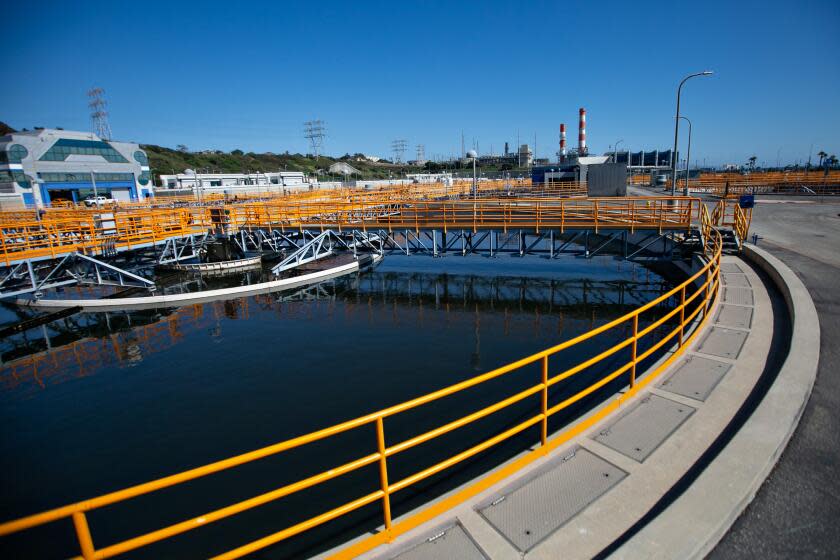L.A. City Council backs plan to double sewer fees

- Oops!Something went wrong.Please try again later.
Many Los Angeles residents will see their sewer fees double over the next four years, with the City Council approving the increases Tuesday over the objections of business groups concerned that landlords will be disproportionately affected.
The council voted 11 to 4 for the rate hikes, with Councilmembers Monica Rodriguez, Kevin de León, Imelda Padilla and Heather Hutt dissenting.
The increases are needed to fund the rising cost of construction and materials, officials with the Bureau of Sanitation said. The officials said that labor costs will rise 24% over the next five years because of a recent salary package for city workers backed by Mayor Karen Bass and the council.
At Tuesday's meeting, Councilmember Katy Yaroslavsky, who chairs the city's Energy and Environment Committee, urged the council to support the series of increases. There hasn't been an increase since 2020, when the council paused consideration of higher fees because of COVID-19.
"Unfortunately, this is one of those situations where we find ourselves between a rock and a hard place," said Yaroslavsky, who called the fee raise "not insignificant."
Because the rate increases are considered a property user fee under Proposition 218, the city's roughly 850,000 parcel owners will be notified. If most object, then the fee hike fails, according to city officials.
Under the city proposal, the bimonthly sewer charge for a typical single-family home would increase from $75.40 to $92.04 in October, according to sanitation officials. By July 2028, the rate would rise to $155.48, more than double the current rate.
The typical bimonthly sewer fee for residential buildings with four units or less, which is now $145, would rise to $177 in October and $299 in July 2028, according to the report.
For buildings with five units or more, the fee is typically $858.40 a month. Rates would go up to $1,047.84 by October and to $1,770.08 by July 2028.
Landlords whose units are rent-stabilized — the vast majority of units in the city — typically can't pass on water costs, which are linked to sewer costs, to their tenants, according to city officials.
Before the meeting, business groups accused the city of failing to properly explain the need for the fee increases.
Daniel Yukelson, executive director of the Apartment Assn. of Greater Los Angeles, told The Times that landlords were barred from raising rents for several years because of COVID-19 and face other rising costs.
"Such an increase on this massive scale will prove to be yet another straw that breaks the back of the city’s rental housing providers," said Yukelson. "There’s no end in sight for such a mismanaged city with its bloated salary and overall cost structure, wasted resources and insatiable appetite to seek new and higher taxes and impose significantly higher fees on ratepayers."
Stuart Waldman, president of the Valley Industry and Commerce Assn., called the fee hikes "rushed" and accused officials of failing to do enough public outreach.
"This is the wrong way to do something that increases rates so drastically," he said.
Bass' proposed budget for the fiscal year starting July 1 relied on the rate hikes. Councilmember Rodriguez expressed concern about that, telling her colleagues that the higher fees were "baked into the budget."
Rodriguez unsuccessfully lobbied for her colleagues to commission an independent analysis of the rate increases from the city's Office of Public Accountability.
De León also expressed skepticism about the process for seeking the rate increases.
"This sounds like a jam job," he said.
Money collected from the fees may be used only for sewer-related purposes.
But the fee increases will have an impact on the city’s general fund, which pays for basic services such as police and fire. The fund subsidizes low-income residents who are charged the sewer fee. That means the higher the fee, the larger the contribution from the general fund to aid needy families, budget officials said.
City officials say the money from the rate hikes will pay for infrastructure repairs, including upgrades to aging sewer pipes.
The increase will also help satisfy the agencies that assess the reliability of the city’s bond programs, city analysts said at a hearing this month.
Anna Ortega, assistant general manager at the city's Housing Department, at a committee hearing last week sought to ease concerns about the effect on landlords.
Ortega cited Housing Department research showing that of the income that a landlord receives annually from tenants, about 35% goes into operating expenses for the property. Of that 35%, about 1.5% goes to sewer costs.
“What I'm trying to say is that the utility percent, even though it's going up — it's a small percent of the operating expenses and of the operating income,” she said.
This story originally appeared in Los Angeles Times.

